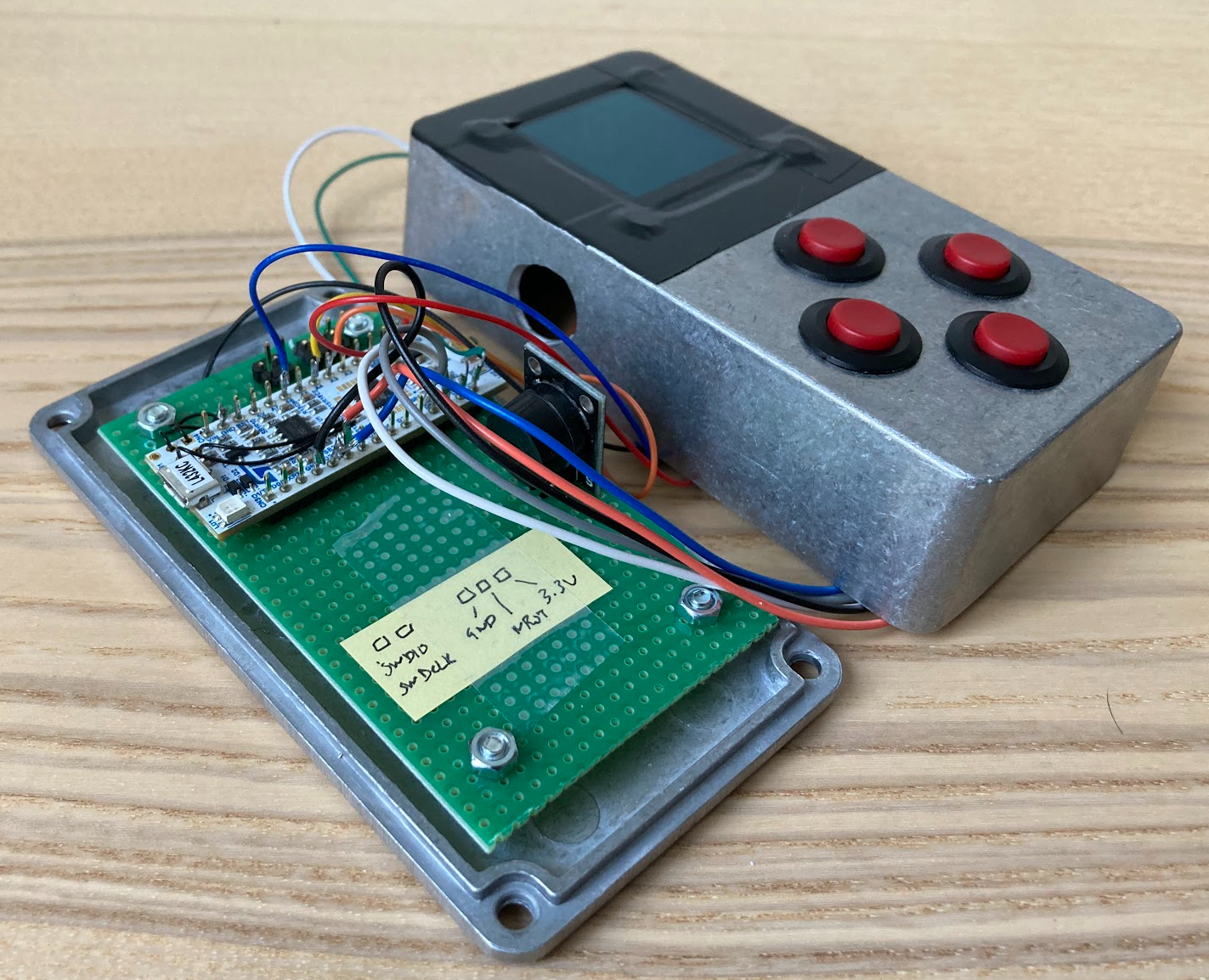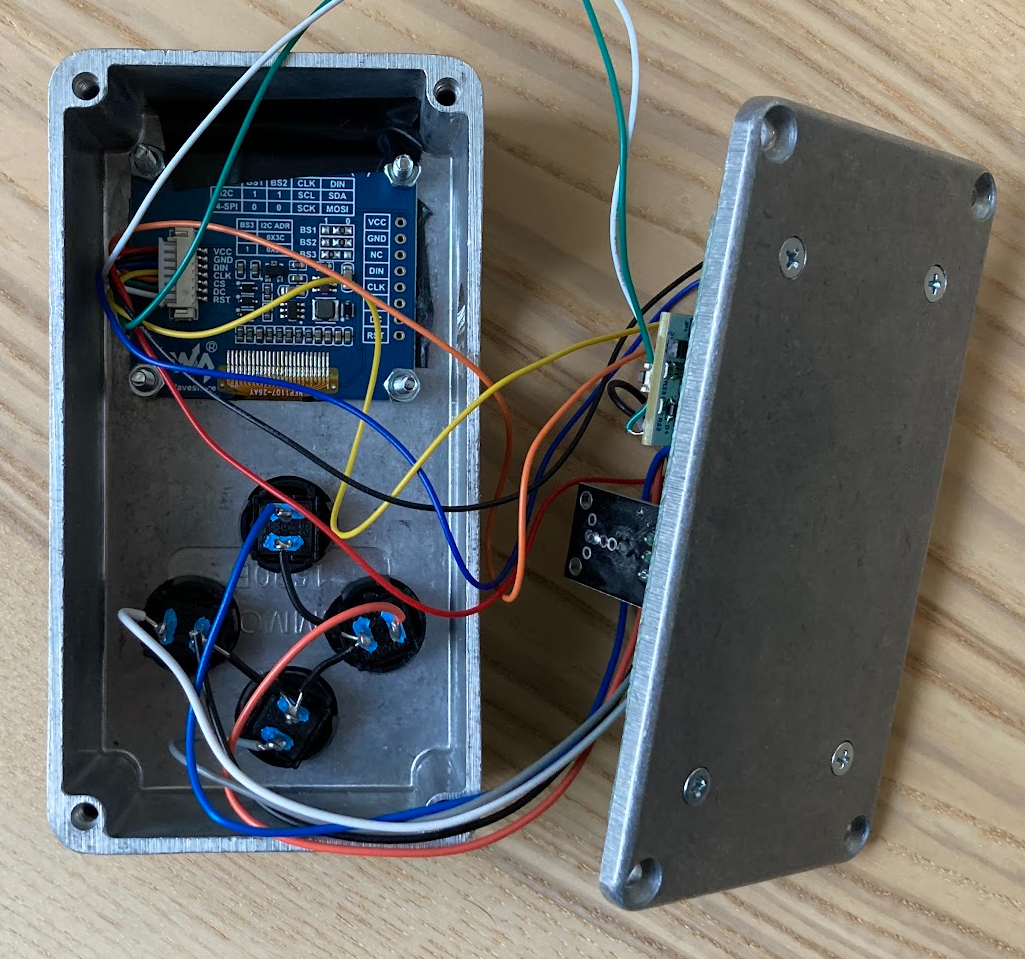I decided to create a complete device for playing the game Snake (originally
introduced in Nokia cell phones back in 1998). My version is based around a Cortex M4 MCU
on a pre-built development PCB (ST Nucleo), with an 1.5" OLED SPI controlled display, a small aluminum chassis,
four push-buttons and a passive buzzer. Everything is soldered and drilled by hand and powered
via USB on the development board. The game itself is written in C and compiled with ARM GCC. It
features the usual snake features and a persistent high score list.


|
||
Seamless calendar with basic workday/weekend count and date range calculations.
It's available at cal.finurligt.se

|
||
Remember Ports of Call? One part of this game was to
navigate/steer a ship into the harbor. This is an implementation of that part, done in
HTML5 and Javascript. The game is available at harbor.finurligt.se and should work in
most browsers.

|
||
Basic HTTP API to maintain an integer value per ID with permanent storage. ID is an arbitraty integer that identifies your project/session/etc. The value can be set, fetched or increased. No authentication is needed, rock'n'roll. Please
see counter.finurligt.se for API documentation.
|
||
Slanforce is a simple 2.5D space game for Android™, Apple® iOS and BlackBerry® 10 devices. The goal is to navigate a space ship from the starting point, collect eventual objects and land on the exit tile. A score is calculated based on the amount of energy used. Using less energy generates a higher score. There are several obstacles that will make levels and game play varying and fun. For example: enemies (two different fire rates), elecric beams, gravity wells (both attracting and repelling), refuel tiles and levels with reverse gravity. An online leaderboard is available.
There is a separate page for slanforce, which can be found here |
||
Dephender is an architecture analyzer for Java code. It works on .class files and presents a
graphical view of your architecture that shows packages, classes and interfaces. Arrows indicate the direction of
a dependency and the small number on each arrow indicates the number of dependencies between the two entities. A separate
list will tell you exactly what methods or static accesses that is causing the dependencies.
Dephender indicates cyclic dependencies with red arrows, which is usually a sign of bad design.
Other features include a screenshot export feature (png format).

More information (and download link) can be found here |
||
Yet Another Interval Trainer. Several similar (and better) applications like this already exist
for free on the Android market. YAIT runs its timers as an Android background service and has a minimal
setup UI (that is, no UI displaying ticking timers like most other apps). Instead of a visual timer UI, the
vibrator service is used to indicate what interval that is currently running. The application can be configured
to emit a continuous vibration when in the high or low interval. The idea was to keep
the device in your pocket and still be notified about high and low intervals. Unfortunately the vibrator
on the tested devices (X10mini and T-mobile G1) is to weak to be noticed with the device in your pocket.
YAIT uses a custom view/dialog to select the timer values (inspired by the native Alarm application on the Sony Ericsson X10mini). A simple demo project using the custom view is submitted on github. You can clone from git://github.com/f98hfr/NumberPickerDemo.git.  Even if this application is pretty basic I added a few sounds and made it available on the market. |
||
Java SWT application that acts as a UPnP control point. Discovered devices are dynamically
added and removed from a list of visible UPnP devices. If a device is clicked, the shared
files from that device are displayed in a second window. A third window displays a debug log
with information about what actions are available on discovered devices and other UPnP network
related information.
Note that this application merely spies on what is available on the network. There are similar applications that do a much better job at doing this, like the Intel UPnP tools package. The UPnPBrowser application was written mainly to test the capabilities of the CyberGarage library. No connections between a renderer and a server can be made with this application, and the actions on discovered devices are very limited. 
|
||
GhostRunner was supposed to be very similar to the horde of "exercise with a map and timer"-
applications on the market but with one key difference - much like a car computer game it
should feature a ghost that should indicate your best run on a specific track. There should
also be a voice telling you your position compared to the ghost and other status information:
"You are 30m ahead", "You are 100m behind", "Your speed is 9 km/h", "Distance this far 1500 meters"
and so on.
Unfortunately an application like this already exists, see CardioTrainer from WorkSmart Labs. Since part of that application is not free I might continue this project some day, until then, it is cancelled. 
|
||
Slancontrol is single player racer game developed in C++ using DirectX.
Slancontrol features four different levels, realistic physics simulation and
an online high score list.
|
||
After having spent hours browsing/searching through long debug log files that various
programs/systems output I wrote this program. FilterView reads a text file and displays
it as normal. The key feature is that one or several filters can be applied. All filters
works on tokens and decorates the found lines with different colors. This made my life
working with long log files easier. In the current version a token is just a sub string;
future versions will include full regular expression support when creating tokens. Unfortunately a
screenshot of FilterView is missing :(.
|
||
|
||
HarryPlotter is a real time plotter that reads data from a serial port.
The data format and number of channels is dynamic. This application was written
using Visual C++ and the MFC libraries. There are a lot of settings to control
the X and Y resolution, colors and line types. The serial port interface used is
the CSerial class from Ramon de Klein
that wraps the native Win32 serial port API.
 There is a separate site for HarryPlotter with more information and a
download link here
There is a separate site for HarryPlotter with more information and a
download link here
|
||
A MUD (Multi User Dungeon) server based on a plain telnet server (no security/SSH). The server is
started with a .mud file that is created with WorldEdit.
Supported commands include navigation (n,s,w,e), examination exa, stats, character inventory etc.

|
||
An MFC Win32 graphical editor used to generate worlds for the QuarkMud Server. MUD rooms
are shown as small boxes and the valid connections are drawn as lines from the connection
boxes. All room descriptions, monsters, items, drops and events can be edited in WorldEdit.
Features also include a random item generator and a random monster generator. The output file
(the complete MUD) can then be started and served through the QuarkMud Server.


 WorldEdit can be downloaded here
WorldEdit can be downloaded here
|
||
Network multiplayer space shooter game developed together with two friends in C++ using DirectX. Gameplay
is in many ways similar to the old classics Thrust and Gravity Force. Graphics include some nice CgFX shader effects.
Fuelhack also features an in-game console with a lot of commands (this console looks like the Quake3 console).
 Multiplayer architecture is a client-server approach where the server keeps a simulation of the
current game state. IP communication is done using raw
Berkely sockets. The server has it's own front
end GUI (that can interpret commands like kick, list, snaps etc)
Multiplayer architecture is a client-server approach where the server keeps a simulation of the
current game state. IP communication is done using raw
Berkely sockets. The server has it's own front
end GUI (that can interpret commands like kick, list, snaps etc)

There are a set of additional screenshots of this game here |
||
Level editor for the Fuelhack game. An MFC Win32 application that wraps a DirectX surface,
that is, editing is done in real 3D. Objects are loaded from plain mesh X-files and can be scaled, rotated and
translated by editor commands. Special items like the gravity well, player start position or normal D3DLights can
be created in Maphack as well. Output from Maphack (the actual level) can easily be loaded in Fuelhack.

|

